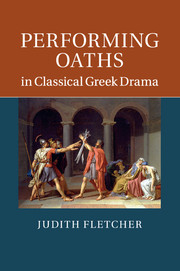Book contents
- Frontmatter
- Contents
- Acknowledgments
- A note on abbreviations
- Introduction
- Chapter 1 From curses to blessings: horkos in the Oresteia
- Chapter 2 Speaking like a man: oaths in Sophocles’ Trachiniae and Philoctetes
- Chapter 3 Horkos in the polis: Athens, Thebes and Sophocles
- Chapter 4 Perjury and other perversions: Euripides’ Phoenissae, Orestes and Cyclops
- Chapter 5 Twisted justice in Aristophanes’ Clouds
- Chapter 6 Women and oaths in Euripides
- Chapter 7 How to do things with Euripides: Aristophanes’ Thesmophoriazusae
- Chapter 8 Swearing off sex: the women's oath in Aristophanes’ Lysistrata
- Conclusion
- Bibliography
- Index locorum
- General index
- References
Bibliography
Published online by Cambridge University Press: 05 December 2011
- Frontmatter
- Contents
- Acknowledgments
- A note on abbreviations
- Introduction
- Chapter 1 From curses to blessings: horkos in the Oresteia
- Chapter 2 Speaking like a man: oaths in Sophocles’ Trachiniae and Philoctetes
- Chapter 3 Horkos in the polis: Athens, Thebes and Sophocles
- Chapter 4 Perjury and other perversions: Euripides’ Phoenissae, Orestes and Cyclops
- Chapter 5 Twisted justice in Aristophanes’ Clouds
- Chapter 6 Women and oaths in Euripides
- Chapter 7 How to do things with Euripides: Aristophanes’ Thesmophoriazusae
- Chapter 8 Swearing off sex: the women's oath in Aristophanes’ Lysistrata
- Conclusion
- Bibliography
- Index locorum
- General index
- References
- Type
- Chapter
- Information
- Performing Oaths in Classical Greek Drama , pp. 249 - 269Publisher: Cambridge University PressPrint publication year: 2011



